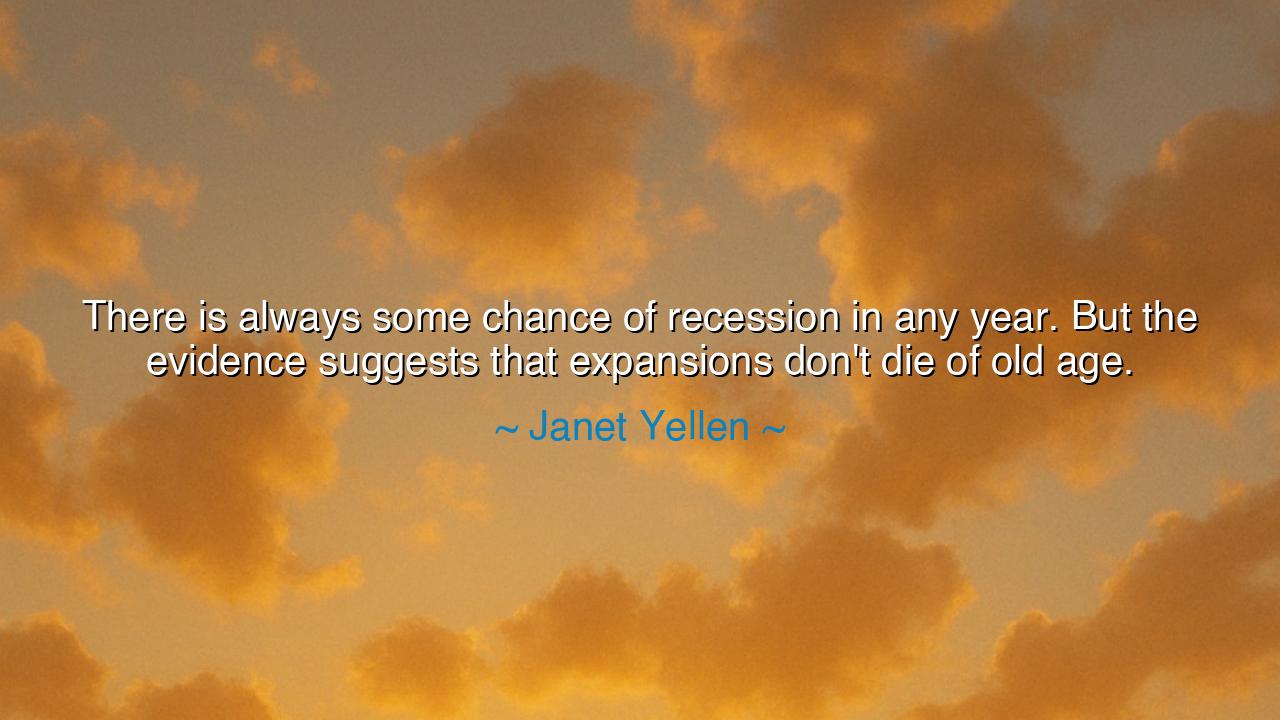
There is always some chance of recession in any year. But the
There is always some chance of recession in any year. But the evidence suggests that expansions don't die of old age.






In the unpredictable tides of life, there is a wisdom that has been passed down through the ages: that change, in all its forms, is inevitable. Yet, it is not always the passage of time itself that leads to decline, but rather the forces that shape and direct it. Janet Yellen, in her reflection on the nature of economic cycles, speaks to this truth with insight and clarity: "There is always some chance of recession in any year. But the evidence suggests that expansions don't die of old age." These words invite us to reconsider the nature of growth and decay, reminding us that while the future is never certain, it is not simply the passage of time that leads to stagnation but rather the forces—both internal and external—that determine the direction of any period of prosperity.
The ancients understood this concept well. Heraclitus, the great philosopher, taught that change is the very nature of the universe: "Everything flows, nothing stays." And yet, in his view, even though all things change, the cycle of growth and decay is not arbitrary. Forces beyond mere time, such as wisdom, virtue, and action, can guide the cycle. He understood that societies, like economies, do not wither simply because they have existed for too long; they falter when they lose the essential forces that once sustained them—be it in leadership, in discipline, or in a failure to adapt to changing conditions. Yellen’s insight aligns with this view: expansions do not fade away simply because they have reached an age; they wither when they fail to evolve.
Consider the story of Rome—a civilization that endured for centuries. It did not crumble under the weight of time, but rather because of the decay within its own structures. As long as Rome maintained a dynamic and adaptive approach to governance, trade, and military expansion, it thrived. Yet, over time, complacency, internal corruption, and failure to innovate led to its slow decline. The Roman Empire did not die from old age but from the failure to renew the forces that once sustained it. Similarly, Yellen’s words remind us that prosperity—whether in an empire or an economy—requires constant attention, adaptation, and renewal. It is the failure to recognize the need for this renewal that leads to a downturn, not merely the ticking of the clock.
In the life of Alexander the Great, we see a contrast to this. Though he conquered vast territories, expanding the Greek empire beyond measure, he did not allow his empire to stagnate. He adapted to local cultures, learned new strategies, and inspired his troops to greatness. Even as he faced battles, both internal and external, Alexander recognized that the forces of expansion did not end with his victories; they continued as long as there was change in the air. However, his untimely death marked a moment when the empire was not prepared to sustain his vision, leading to fragmentation. In this way, Alexander’s empire did not die because it aged, but because the forces of growth and adaptation were no longer maintained.
Yellen’s reflection on economic expansions teaches us that the cycle of growth is not guaranteed to decline due to age. What matters, then, is the maintenance of the right conditions for continued success. Just as a plant grows not merely because time passes, but because of the nourishment, light, and care it receives, so too must any economy, organization, or individual nurture the forces that support its prosperity. Whether it is through innovation, leadership, or adaptability, we must continually sow the seeds of renewal, for it is only through these efforts that we avoid stagnation and ensure that growth persists.
This truth can also be applied in our personal lives. As we journey through the seasons of our own experiences, we must remember that growth is not a linear path but a constant process of renewal. It is easy to fall into the trap of thinking that we must reach a certain age or stage of life and then simply rest. But to live fully is to engage in the ongoing process of evolution, of reimagining ourselves, of adapting to new challenges. Whether in our careers, relationships, or personal growth, the lesson is clear: we do not decline simply because we have grown older, but because we have failed to engage with the forces that keep us dynamic and vibrant.
Thus, let us take Yellen's wisdom into our hearts and our actions. Whether we are guiding an economy, leading a community, or simply living our daily lives, we must renew the forces that drive our expansion—be it through learning, adapting, or simply being aware of the changing tides around us. Let us not become complacent, but actively nurture the forces that drive us forward, knowing that growth is not something that simply happens over time. It is the product of our decisions, our actions, and our willingness to embrace change. In this, we will ensure that the expansions of our lives do not wither from neglect, but thrive with the vigor of sustained effort.






AAdministratorAdministrator
Welcome, honored guests. Please leave a comment, we will respond soon